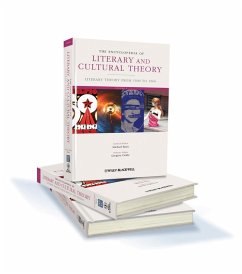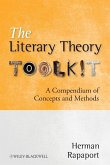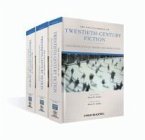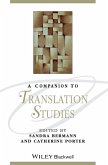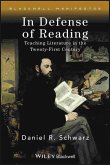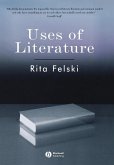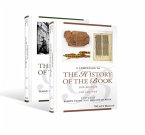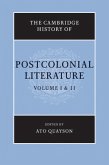This is the first comprehensive multi-volume encyclopedia of literary and cultural theory. Arranged in three volumes covering Literary Theory from 1900 to 1966, Literary Theory from 1966 to the present, and Cultural Theory, this encyclopedia provides accessible entries on the important concepts, theorists and trends in post-1900 literary and cultural theory. With explanations of complex terms and important theoretical concepts, and summaries of the work and ideas of key figures, it is a highly informative reference work for a multi-disciplinary readership
Part of the Wiley-Blackwell Encyclopedia of Literature
Contains over 300 entries of 1000-7000 words written by an international cast of nearly 300 leading scholars in literary and cultural theory
Provides explanations of complex terms, important theoretical concepts, and tools for critical analysis
Provides summaries of the work and ideas of key figures such as Jacques Derrida, Michel Foucault, Judith Butler, and Slavoj Zizek, and many more
Online version provides students and researchers with 24/7 access to authoritative reference and powerful searching, browsing and cross-referencing capabilities
Special introductory price available
Hinweis: Dieser Artikel kann nur an eine deutsche Lieferadresse ausgeliefert werden.
Part of the Wiley-Blackwell Encyclopedia of Literature
Contains over 300 entries of 1000-7000 words written by an international cast of nearly 300 leading scholars in literary and cultural theory
Provides explanations of complex terms, important theoretical concepts, and tools for critical analysis
Provides summaries of the work and ideas of key figures such as Jacques Derrida, Michel Foucault, Judith Butler, and Slavoj Zizek, and many more
Online version provides students and researchers with 24/7 access to authoritative reference and powerful searching, browsing and cross-referencing capabilities
Special introductory price available
Hinweis: Dieser Artikel kann nur an eine deutsche Lieferadresse ausgeliefert werden.
"Hailed as the "first comprehensive multi-volume encyclopedia of literary and cultural theory," this work fulfills these high expectations by providing well-written articles by scholars for nonspecialists; through its thorough, up-to-date coverage; and by succeeding in situating theorists and movements, and explaining relationships, as well as enticing readers to delve deeper into subjects . . .Appropriately priced, this three-volume encyclopedia is a valuable addition to collections owning the earlier guide. Summing Up: Recommended. Lower-level undergraduates through researchers; general readers." (Choice, 1July 2011)
"Part of Blackwell Reference Online, the Wiley-Blackwell Encyclopedia of Literature is a database with content from several new stand-alone scholarly literature reference sets. Together, they provide almost 1,000 entries on the history, terminology, genres, and theory of the novel; major writers, works, movements, and genres of twentieth-century British, American, and world fiction; and terms and concepts related to post-1900 literary and cultural theory. The database would be a good investment for libraries that want to acquire the content." (Mary Ellen Quinn, Booklist, April 2011)]
"These three stand-alone titles work well together; overlapping entries complement rather than duplicate each other. Four planned but as yet unpublished titles in this seven-title series are The Encyclopedia of English Renaissance Literature , The Encyclopedia of Romantic Literature , The Encyclopedia of the Gothic , and The Encyclopedia of Postcolonial Studies . It would be nice to see a single cumulative or series index tying all seven together to create the most efficient access method for the serious researcher. Part of the larger series, these first three titles can be purchased separately or all together for $1,585 (ISBN 9781444320886).
The Encyclopedia of Literary and Cultural Theory. 3 vols. Wiley-Blackwell. (Encyclopedia of Literature). 2011. 1544p. ed. by Michael Ryan. bibliog. index. ISBN 9781405183123. $495. Online: Blackwell Reference Online REF
Based on the premise that literature mirrors life, which mirrors the surrounding society and culture, this unique work employs 320 signed articles written by 223 academic contributors at various Anglo-American institutions to connect literature and sociology. Organized in dictionary format within time period and type of theory (social or literary), articles range from two and three-quarters pages ("Abrams, M.H.") to 111/2 pages ("Narrative Theory"). Each entry includes a bibliography. Volumes 1 and 2 cover literary theories between 1900 and 1966 and from 1966 to the present day. Cultural theories appear in Volume 3. See also references incorporating entries in all three volumes, cross-references within the text, and a detailed index ensure easy research access. Overall, the volume editors provide good coverage, though this work could be stronger. For example, the literary movement realism is discussed only as it pertains to the modernism movement despite its having been prevalent during the 19th century. General editor Ryan (film & media arts, Temple Univ.) has authored several books, including Literary Theory: A Practical Introduction. BOTTOM LINE An excellent resource for those attempting to tie literature to the society surrounding it. Recommended for advanced undergraduate and graduate students in literature, writing, sociology, and anthropology.-Laurie Selwyn, formerly with Grayson Cty. Law Lib., Sherman, TX
The Encyclopedia of the Novel. 2 vols. Wiley-Blackwell. (Encyclopedia of Literature). 2011. 1024p. ed. by Peter Melville Logan. illus. bibliog. index. ISBN 9781405161848. $350. Online: Blackwell Reference Online REF
The 143 signed, alphabetically arranged five- (e.g., "Feminist Theory" and "Gender Theory") to nine-page (e.g., "Narrator" and "Authorship") articles written by 134 academic (and one nonacademic, Hyphen Press founder Robin Kinross) authors include short bibliographies, thorough See also notes, and cross-references within the articles. Volume 2 also contains an author index and a detailed subject index. The text is very readable, but because the editors take a global approach and rely on a very broad definition of "novel," many genres and subgenres will be unfamiliar to the average reader, making this title most appropriate to the academic world. This set could be even better if the editors split several complex articles into two or more articles. For example, in a global rather than a local view, copyright and libel are treated together in a brief six pages ("Copyright/Libel"), leaving the reader wanting more. Logan (Victorian Fetishism: Intellectuals and Primitives ) teaches English at Temple University. BOTTOM LINE Intended for the advanced literature student, this set will overwhelm the average reader. Recommended for upper-class undergraduate and graduate literature and writing majors.-Laurie Selwyn, formerly with Grayson Cty. Law Lib., Sherman, TX
"The Wiley-Blackwell Encyclopedia of Literature is a database with content from several new stand-alone scholarly literature reference sets. Together, they provide almost 1,000 entries on the history, terminology, genres, and theory of the novel; major writers, works, movements, and genres of twentieth-century British, American, and world fiction; and terms and concepts related to post-1900 literary and cultural theory. The database would be a good investment for libraries that want to acquire the content." (Mary Ellen Quinn, Booklist, April 2011)
"Part of Blackwell Reference Online, the Wiley-Blackwell Encyclopedia of Literature is a database with content from several new stand-alone scholarly literature reference sets. Together, they provide almost 1,000 entries on the history, terminology, genres, and theory of the novel; major writers, works, movements, and genres of twentieth-century British, American, and world fiction; and terms and concepts related to post-1900 literary and cultural theory. The database would be a good investment for libraries that want to acquire the content." (Mary Ellen Quinn, Booklist, April 2011)]
"These three stand-alone titles work well together; overlapping entries complement rather than duplicate each other. Four planned but as yet unpublished titles in this seven-title series are The Encyclopedia of English Renaissance Literature , The Encyclopedia of Romantic Literature , The Encyclopedia of the Gothic , and The Encyclopedia of Postcolonial Studies . It would be nice to see a single cumulative or series index tying all seven together to create the most efficient access method for the serious researcher. Part of the larger series, these first three titles can be purchased separately or all together for $1,585 (ISBN 9781444320886).
The Encyclopedia of Literary and Cultural Theory. 3 vols. Wiley-Blackwell. (Encyclopedia of Literature). 2011. 1544p. ed. by Michael Ryan. bibliog. index. ISBN 9781405183123. $495. Online: Blackwell Reference Online REF
Based on the premise that literature mirrors life, which mirrors the surrounding society and culture, this unique work employs 320 signed articles written by 223 academic contributors at various Anglo-American institutions to connect literature and sociology. Organized in dictionary format within time period and type of theory (social or literary), articles range from two and three-quarters pages ("Abrams, M.H.") to 111/2 pages ("Narrative Theory"). Each entry includes a bibliography. Volumes 1 and 2 cover literary theories between 1900 and 1966 and from 1966 to the present day. Cultural theories appear in Volume 3. See also references incorporating entries in all three volumes, cross-references within the text, and a detailed index ensure easy research access. Overall, the volume editors provide good coverage, though this work could be stronger. For example, the literary movement realism is discussed only as it pertains to the modernism movement despite its having been prevalent during the 19th century. General editor Ryan (film & media arts, Temple Univ.) has authored several books, including Literary Theory: A Practical Introduction. BOTTOM LINE An excellent resource for those attempting to tie literature to the society surrounding it. Recommended for advanced undergraduate and graduate students in literature, writing, sociology, and anthropology.-Laurie Selwyn, formerly with Grayson Cty. Law Lib., Sherman, TX
The Encyclopedia of the Novel. 2 vols. Wiley-Blackwell. (Encyclopedia of Literature). 2011. 1024p. ed. by Peter Melville Logan. illus. bibliog. index. ISBN 9781405161848. $350. Online: Blackwell Reference Online REF
The 143 signed, alphabetically arranged five- (e.g., "Feminist Theory" and "Gender Theory") to nine-page (e.g., "Narrator" and "Authorship") articles written by 134 academic (and one nonacademic, Hyphen Press founder Robin Kinross) authors include short bibliographies, thorough See also notes, and cross-references within the articles. Volume 2 also contains an author index and a detailed subject index. The text is very readable, but because the editors take a global approach and rely on a very broad definition of "novel," many genres and subgenres will be unfamiliar to the average reader, making this title most appropriate to the academic world. This set could be even better if the editors split several complex articles into two or more articles. For example, in a global rather than a local view, copyright and libel are treated together in a brief six pages ("Copyright/Libel"), leaving the reader wanting more. Logan (Victorian Fetishism: Intellectuals and Primitives ) teaches English at Temple University. BOTTOM LINE Intended for the advanced literature student, this set will overwhelm the average reader. Recommended for upper-class undergraduate and graduate literature and writing majors.-Laurie Selwyn, formerly with Grayson Cty. Law Lib., Sherman, TX
"The Wiley-Blackwell Encyclopedia of Literature is a database with content from several new stand-alone scholarly literature reference sets. Together, they provide almost 1,000 entries on the history, terminology, genres, and theory of the novel; major writers, works, movements, and genres of twentieth-century British, American, and world fiction; and terms and concepts related to post-1900 literary and cultural theory. The database would be a good investment for libraries that want to acquire the content." (Mary Ellen Quinn, Booklist, April 2011)

